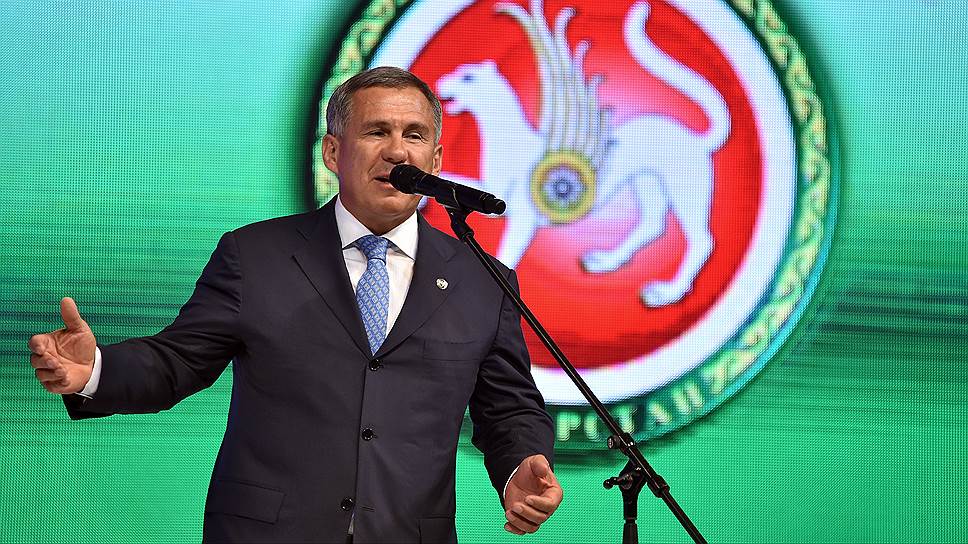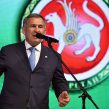
Tatarstan’s President Defies Kremlin Efforts to Unite Russians against Another Common ‘Enemy’
Publication: Eurasia Daily Monitor Volume: 13 Issue: 3
By:

An unexpected result of Russia’s aggressive foreign policy in the Middle East has been Tatarstan’s opposition to the decision to cut ties with Turkey. After a Turkish F-16 downed a Russian warplane that allegedly crossed from Syria into Turkey’s airspace last November, President Vladimir Putin vowed to punish Ankara for what he called “backstabbing.” The Russian government then severed economic ties with Turkey, officially imposing sanctions in two separate presidential decrees (Gazeta.ru, November 28, 2015 and Lenta.ru, December 28, 2015). The sanctions ended or restricted the activities of Turkish companies and companies owned by Turkish citizens in Russia, imposed a visa regime, and restricted exports and imports between the two countries. Since Russia itself is under sanctions by the Western countries for the annexation Crimea and the aggressive covert war in eastern Ukraine, some experts say that Russian economic sanctions against Turkey will harm Russia more than Turkey (Bfm.ru, November 29, 2015).
It comes as no surprise that many Russian consumers are unhappy about the business restrictions imposed by the Russian government on Turkey. However, what came as a shock to many observers was the open opposition to Vladimir Putin by a leader of one of Russia’s regions—Tatarstan’s President Rustam Minnikhanov. On December 21, Minnikhanov told journalists that Turkish businesses would continue to operate in the republic, contradicting not only Putin’s decrees targeting Turkish businesses, but also the hysterical anti-Turkish media campaign in Russia. Minnikhanov tried to avoid a direct collision with Moscow by skillfully reinterpreting Putin’s own words. “I can refer to what our president said, that Turkey is a friendly nation,” Minnikhanov said. “For Tatars, the Turks are a brotherly people. We belong to the same language group and to the same religion. What the president said is a very serious support for us, because we have large Turkish investment projects. They have believed in our president.” Tatarstan’s president estimated Turkish investments in his republic at $1.5 billion and said he expected more Turkish investment. Interestingly, Minnikhanov went even further in criticizing Russian government policies, especially the persistent anti-American propaganda campaign. “I am prepared to be friends with everybody who invests into Tatarstan,” he said. “Skin color, nationality, religion do not matter! They say that Americans do not like us. They built two factories here in our special economic zone and everything is fine, we work together well” (Rbc.ru, December 22, 2015).
Tatarstan’s muted diatribe against the Kremlin’s policies was the first vivid signal of brewing tensions between Vladimir Putin and Russia’s regional elites. One Soviet apologist even expressed fears that Tatarstan might do to the Russian Federation what Ukraine did to the Union of Soviet Socialist Republics (USSR)—namely. initiate the process of its dismantlement (Forum-msk.org, January 5). Tatarstan is evidently the champion of regionalism in Russia, with the resources to preserve its autonomy. Tatarstan’s governor still has the official title of “president,” even though Moscow tried to change his title to “head,” as in Russia’s other republics. Tatarstan essentially ignored the Russian federal law that explicitly prohibits regional governors from using the title “president” (Gazeta.ru, December 30, 2015).
Tatar intellectuals remain hopeful that Russian-Turkish relations will become normal again after a relatively brief deterioration. “ ‘Enemy Number One’ in Russia comes and goes quickly,” said Rafael Khakimov, an analyst and political activist in Kazan. “By next summer, the tensions will likely dissipate” (Svoboda.org, January 5).
The optimism of Tatars about Russian-Turkish relations may be premature because the conflict continues to develop, and neither Vladimir Putin nor Recep Erdoğan of Turkey appears willing to back down. Russia’s retreat from the Middle East would probably create the conditions for reconciliation between the two countries, but it would also be seen as a defeat in Russia, especially if the Syrian regime falls. At the same time, Turkey has been a major destination for Russian tourists, so the Russian government will be under pressure next summer to reopen travel to Turkey. No other country exists to replace Turkey as a summer destination for Russian tourists, especially given the fact that Egypt has also become off limits since a bomb exploded on a Russian airliner flying from an Egyptian resort to Russia last October.
The surprise backlash from Tatarstan’s president indicates that the patience of Russian regional elites, and possibly the Moscow elites, is wearing thin. The elites must have thought that the economic situation in Russia would improve quickly, but it is becoming worse and is projected to deteriorate further. Under these conditions, Putin’s strategy for political survival is to pretend that Russia is surrounded by enemies and the people need to “rally around flag.” This strategy, however, does not seem to be working, according to well-known Kremlin critic Andrei Piontkovsky (Svoboda.org, January 5), because Russians in general are not prepared to shoulder financial burdens for causes that seem increasingly dubious and unworthy. The stance of Tatarstan’s president is one of the boldest signals to the Kremlin to date that Russian regions are unhappy with the country’s political course, which is leading to collisions with nearly every power in its neighborhood.




